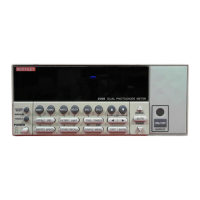Models 2500 and 2502 User’s Manual Remote Operations 13-15
Command path rules
• Each new program message must begin with the root command, unless it is optional
(e.g., [:SENSe[1]]). If the root is optional, simply treat a command word on the next
level as the root. For fastest operation, do not send optional data.
• The colon (:) at the beginning of a program message is optional and need not be used.
Note that eliminating the first colon will result in fastest operation. Example:
:stat:pres = stat:pres
• When the path pointer detects a colon (:) it moves down to the next command level. An
exception is when the path pointer detects a semicolon (;), which is used to separate
commands within the program message (see next rule).
• When the path pointer detects a colon (:) that immediately follows a semicolon (;), it
resets to the root level.
• The path pointer can only move down. It cannot be moved up a level. Executing a com-
mand at a higher level requires that you start over at the root command.
Using common and SCPI commands in the same message
Both common commands and SCPI commands can be used in the same message as long
as they are separated by semicolons (;). A common command can be executed at any com-
mand level and will not affect the path pointer. Example:
:stat:oper:enab <NRf>; *ESE <NRf>
Program message terminator (PMT)
Each program message must be terminated with an LF (line feed), EOI (end or identify),
or an LF+EOI. The bus will hang if your computer does not provide this termination. The
following example shows how a multiple command program message must be terminated:
:outp1 on <PMT>
Command execution rules
• Commands execute in the order that they are presented in the program message.
• An invalid command generates an error and, of course, is not executed.
•Valid commands that precede an invalid command in a multiple command program
message are executed.
•Valid commands that follow an invalid command in a multiple command program
message are ignored.
Test Equipment Depot - 800.517.8431 - 99 Washington Street Melrose, MA 02176
TestEquipmentDepot.com

